AMES, Iowa -- Obesity rates in American children and adolescents have skyrocketed over the past two decades and declining physical activity has been identified as a primary cause.
Russell Pate knows that fact all too well since he coordinated the effort that led to the recommendation on Physical Activity and Public Health by the U.S. Centers for Disease Control and Prevention (CDC) and the American College of Sports Medicine (ACSM). An associate vice president for health sciences and professor in exercise science at the University of South Carolina, he also studied the topic for his 2006 book "Physical Activity Intervention for Youth."
Pate is the visiting Pease Family Scholar at Iowa State University this spring. He will present a free public lecture titled "Physical Activity Promotion for Obesity Prevention in Youth," on Thursday, April 19, at 7 p.m., in ISU's Forker Hall, Room 279. A reception will follow.
An exercise physiologist with interests in physical activity and fitness in children and the health implications of physical activity, Pate has authored or edited five related books and more than 170 scholarly papers. He heads a research team that currently is supported by more than $2 million in funding from such organizations as the National Institutes of Health, the U.S. Centers for Disease Control and Prevention, the American Heart Association, and several private foundations and corporations.
In addition to his work on the national recommendation on Physical Activity and Public Health, Pate served on the U.S. Dietary Guidelines Advisory Committee (2003-04) -- an Institute of Medicine panel that developed guidelines on prevention of childhood obesity. He's past-president of both the National Coalition on Promoting Physical Activity and ACSM.
"He's (Pate) been very much involved with the top federal groups that have tried to not only evaluate health, but set standards for healthy people by the year 2010," said Jerry Thomas, chair and professor in the Department of Health and Human Performance at ISU. "He's really one of the well-know scholars and advocates in that area. And in terms of health-related problems, the growing rate of children's obesity is probably the biggest issue we have."
The consensus public health recommendation indicates that young people should participate in at least 60 minutes of moderate to vigorous physical activity daily, but Pate reports that available surveillance and other data suggest that many U.S. youths fail to meet that standard.
"It should not be that terribly surprising that we see what we see in the statistics -- the prevalence of overweight -- and how that's changed over a period of 35 or 40 years," said Pate in a recent presentation at the University of Virginia. "I'm not sure that obesity, per se, is the overwhelming issue. But I think we have to ask ourselves 'How did it get this way?' And I think it's pretty clearly because of some disadvantageous changes in activity and dietary behavior, and we have to consider some of these significant changes to not only produce this outcome (growing rate of children's obesity), but will very likely produce a wide range of other negative outcomes -- chronic disease and so on. I think there are a lot of reasons why we should be concerned about what's going on in this area within our society."
According to Pate, studies suggest that activity behavior in young people is influenced by a complex set of personal psychosocial, social environmental, physical environmental, and policy factors. His presentation will provide information on school-based programs that have increased physical activity in youths, and other community, clinical and media interventions that have shown promise.
A lifelong distance runner, Pate competed in three U.S. Olympic Trials' marathons and twice placed among the top 10 finishers in the Boston Marathon. For more than 20 years he served as president of the Carolina Marathon Association.
The Pease Family Scholar program was created in memory of Harvey and Bomell Pease, Newport Beach, Calif. The endowment was established in 1991 by their son, Dean Pease, and his wife, Sally, to bring visiting scholars to the Iowa State campus. Dean Pease, who died in 1994, chaired the department of health and human performance from 1987 to 1990.
For more information on the lecture or the Pease Family Scholar program, please visit http://www.hs.iastate.edu/peasescholar/.
